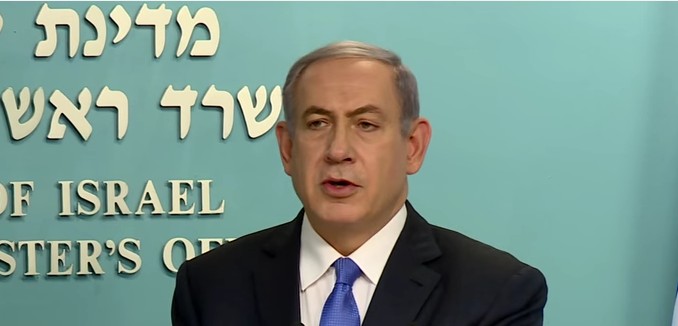The nuclear deal between Iran and the West gives Iran up to three months to delay inspectors from accessing suspected nuclear sites, far longer than the 24 days alleged by proponents of the deal, Israeli Prime Minister Benjamin Netanyahu said today. This would give Iran more than three times as long to hide illicit nuclear activities as the deal, formally known as the Joint Comprehensive Plan of Action (JCPOA), allows.
The Times of Israel reported:
Under the Comprehensive Joint Plan of Action that the world powers signed with Iran earlier this month, Iran has 24 days before it needs to grant international inspectors access to hitherto undeclared sites they suspect host nuclear activity.
But, Netanyahu said, if no agreement has been reached after that time elapses, the deal says that the complaint is to go to another committee trying to bridge the dispute, which will deal with the issue for another 30 days. If Iran still refuses to let inspectors into the site and the United Nations Security Council is involved, it will take another 30 days before any action is taken, the prime minister said.
“It could take a total of three months,” Netanyahu said.
The 24 days comes from paragraph 78 of Annex I of the JCPOA (.pdf):
If the absence of undeclared nuclear materials and activities or activities inconsistent with the JCPOA cannot be verified after the implementation of the alternative arrangements agreed by Iran and the IAEA, or if the two sides are unable to reach satisfactory arrangements to verify the absence of undeclared nuclear materials and activities or activities inconsistent with the JCPOA at the specified locations within 14 days of the IAEA’s original request for access, Iran, in consultation with the members of the Joint Commission, would resolve the IAEA’s concerns through necessary means agreed between Iran and the IAEA. In the absence of an agreement, the members of the Joint Commission, by consensus or by a vote of 5 or more of its 8 members, would advise on the necessary means to resolve the IAEA’s concerns. The process of consultation with, and any action by, the members of the Joint Commission would not exceed 7 days, and Iran would implement the necessary means within 3 additional days.
The initial request for access would take 14 days, followed by seven days of consultation with three days allowed at the end for Iran to comply. However, if Iran still disputed the request, the JCPOA has a process for resolving disputes. To further delay access, Iran could submit the request to access its sites as a dispute to be settled by a process spelled out paragraph 36 of the JCPOA.
36. If Iran believed that any or all of the E3/EU+3 were not meeting their commitments under this JCPOA, Iran could refer the issue to the Joint Commission for resolution; similarly, if any of the E3/EU+3 believed that Iran was not meeting its commitments under this JCPOA, any of the E3/EU+3 could do the same. The Joint Commission would have 15 days to resolve the issue, unless the time period was extended by consensus. After Joint Commission consideration, any participant could refer the issue to Ministers of Foreign Affairs, if it believed the compliance issue had not been resolved. Ministers would have 15 days to resolve the issue, unless the time period was extended by consensus. After Joint Commission consideration – in parallel with (or in lieu of) review at the Ministerial level – either the complaining participant or the participant whose performance is in question could request that the issue be considered by an Advisory Board, which would consist of three members (one each appointed by the participants in the dispute and a third independent member). The Advisory Board should provide a non-binding opinion on the compliance issue within 15 days. If, after this 30-day process the issue is not resolved, the Joint Commission would consider the opinion of the Advisory Board for no more than 5 days in order to resolve the issue. If the issue still has not been resolved to the satisfaction of the complaining participant, and if the complaining participant deems the issue to constitute significant nonperformance, then that participant could treat the unresolved issue as grounds to cease performing its commitments under this JCPOA in whole or in part and/or notify the UN Security Council that it believes the issue constitutes significant non-performance.
This process could add 65 more days to the request for access. Even at the end of these three months, if Iran was found to be in “significant non-performance” of its obligations, it would be referred to the United Nations Security Council, which doesn’t guarantee the inspectors access.
Two months ago, French Foreign Minister Laurent Fabius said that “a lot of things can disappear” if Iran is given 24 days notice before inspectors are allowed to visit suspected nuclear sites. Allowing up to 24 days of deliberations before allowing inspectors to visit to suspicious sites was a retreat from the administration’s previous insistence that inspectors be granted “anytime, anywhere” access, one of several capitulations made by the Western negotiating nations. Fabius’ declaration was backed up by Olli Heinonen, the former deputy director-general of International Atomic Energy Agency, who said that in 24 days, “you will use that [time] to sanitize the place, make new floors, new tiles on the wall, paint the ceiling and take out the ventilation.”
The recent revelation that not all of Syria’s chemical weapons stockpiles were removed after an internationally brokered deal was attributed, in part, to the rogue regime’s ability to control the access of inspectors to suspected chemical facilities.
[Photo: Israeli PM / YouTube ]




